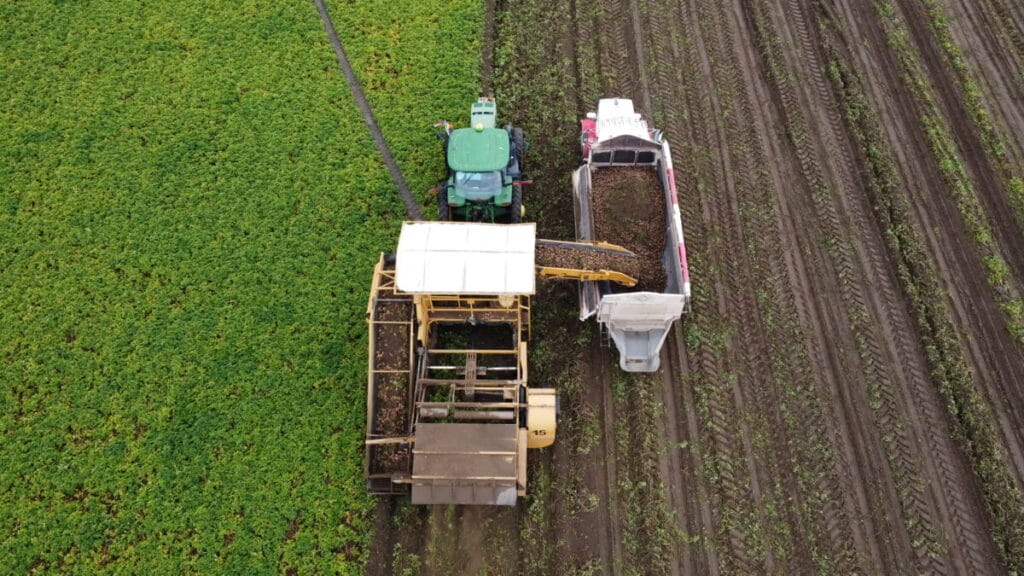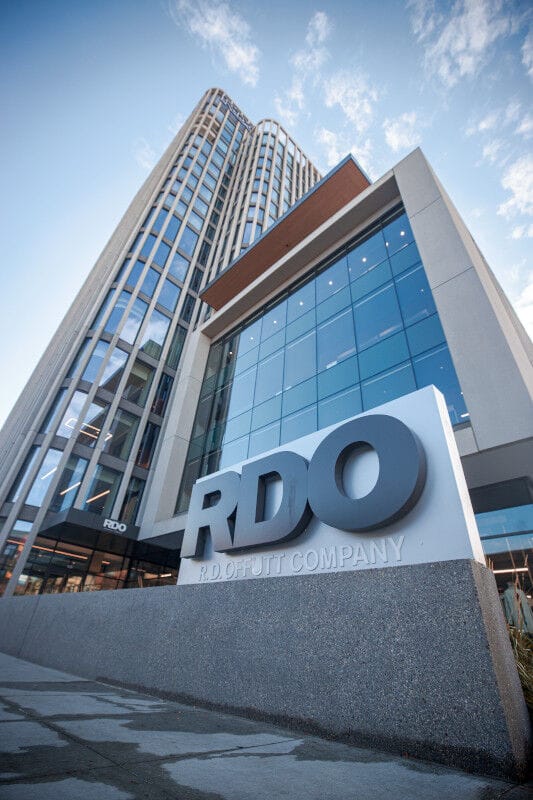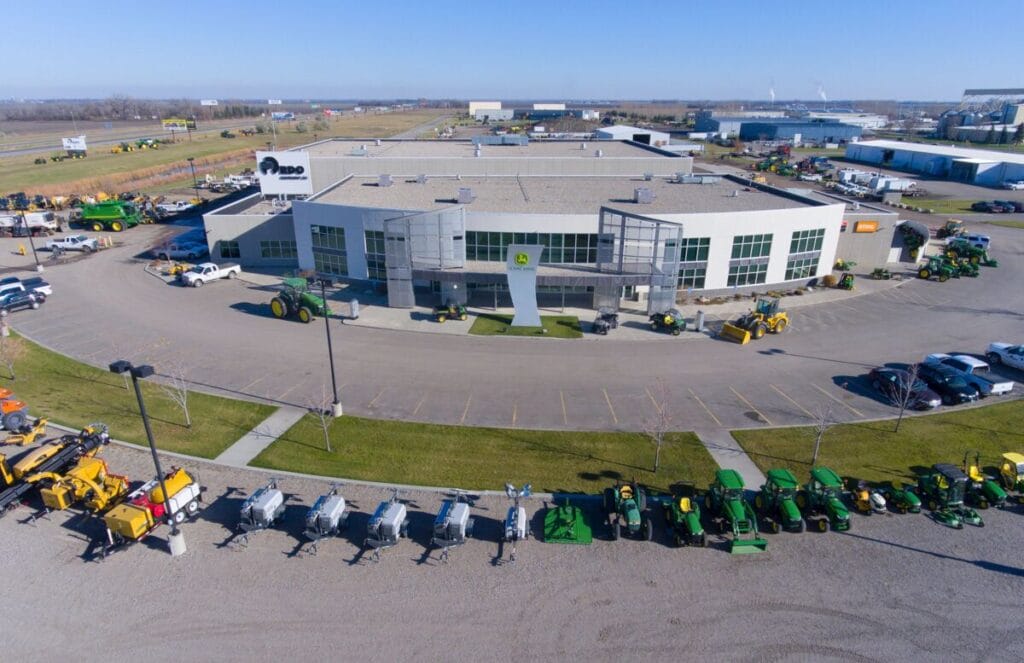Photos provided by R.D. Offutt Company
Ron Offutt, founder of R.D. Offutt Company, is a giant in agriculture. On February 1, he received a Lifetime Impact Award from Emerging Prairie, something he is well deserving of.
In 1968, Ron Offutt, at the age of 26, embarked on a journey that would transform him from a modest farmer in Moorhead, MN, into a pioneering entrepreneur in the agricultural sector. While initially working alongside his father and utilizing equipment from a local John Deere dealership, Ron’s path took a decisive turn when he ventured into the business world by acquiring a dealership in Casselton, ND. This move marked the beginning of the R.D. Offutt Company, laying the foundation for what would become a vast network of over 86 stores across 12 states.
We were lucky enough to sit down with him for a quick interview ahead of the award ceremony.
We jumped from 400 acres to 3,000 acres in one year. If we had failed that year, I wouldn’t be farming or doing any of this today.
Ron Offutt
Q&A
What was it like growing up on the farm? What do you remember about that?
When I was growing up, my dad was primarily a potato farmer with only a moderate amount of success. He was always an optimist with pricing and oftentimes in potato production, prices aren’t your friend.
When I got out of college, I came into a partnership with my father, and we did the same thing that he had been doing. After about three years, we weren’t moving the ball very much.
I didn’t know how much future there was on the farming side. So, I had the opportunity to go into the equipment business and I did. In 1968, I bought a John Deere dealership in Casselton, ND.
I was in there for about a year running the day-to-day operations. After that time, I decided two things. Number one, I wasn’t very good at running a store. Number two, I really didn’t like running a store. So,
I hired a manager to manage the store and I went back to the farm.
That’s kind of how the whole thing started. What changed our future in potato farming was the time period. That was when quick-serve restaurants were just coming into the picture. McDonald’s had just started going nationwide—you had other quick-serve restaurants popping up as well. Those restaurants really grew the french fry business—which gave us a lot of opportunity for very rapid growth.
At the same time that was happening, a lot of the central sandlands in the state of Minnesota were coming out of the soil bank program. A lot of the farmers who put their land in a soil bank program
for 10 years weren’t going to go back and farm the land. Those lands aren’t very productive unless they’re irrigated. It was also a time when center pivot irrigation was just starting to get going. We found out very quickly that if we put water on that sand, it was very good potato production land. That allowed us an opportunity to expand along with the french fry industry.
We jumped from 400 acres to 3,000 acres in one year. If we had failed that year, I wouldn’t be farming or doing any of this today.
Was that a pretty nerve-wracking time for you back then?
No, I think I was too young and stupid. It should have been.
When you graduated from Concordia College, was there any consideration of doing anything other than returning to the farm?
During my senior and junior years in college, I interviewed for jobs. Most of the interviews were with insurance companies. I knew from those interviews that I didn’t want to be one of those folks who had to go sit at a desk every day. I wanted to be a farmer and follow in my father’s footsteps.
It sounds like you turned over that John Deere dealership to a manager pretty quickly—why do you think you were able to do that?
I learned very, very shortly after I hired the manager that it’s a lot easier to manage a manager than to manage the store yourself. Because when you’re managing a manager, you get the benefit of hindsight. You see the mistakes that he or she has made and you probably would have made the same mistake if you were calling the shots on a day-to-day basis. But when you have hindsight working for you, it sure cleans up that vision. That allowed us to drive a culture of taking care of the customers. I instilled in our team very early that our number one job was to take care of the customer. If you give them satisfaction, they’ll come back again.

In your experience, what do you think makes a good manager?
Natural leadership. A good leader is one who circulates and talks to the people that he works with every day. They talk about things to accomplish during the day and assist in going out and helping everybody do their job a little bit better.
There’s no such thing as a bad John Deere store. There are John Deere stores that have bad managers.
If you get a manager who thinks they’re a cut above the rest and who thinks they are there to be served instead of being the server, you’ve got a bad manager. And we’ve had those in the past. And fortunately, through experience, we’ve been able to spot them.
What are the biggest challenges you have faced in your career?
I’ve always had more ideas than I had money. Money was always an obstacle which caused me initially to do a lot of things in partnership with people. A big backbone of our company has been with partners. They’ve brought different things to the business whether it was money, talent, ground, worker bees—just different things.
It’s easy to see a partner that can add to the strength of your organization. Our involvement in the french fry industry has always been a partnership. Idahoan Foods started out as a partnership—now we own 97% of it. I have one partner and a very close friend of mine who I formed a potato-growing partnership with in 1965. We graduated from high school and we’re still partners today and still friends.
So, it seems like you’ve been able to pick pretty good partnerships over the years.
For the most part, yeah, for the most part. We’ve had partnerships that didn’t work out, but most have. If you treat the other person fair, they treat you fair—that’s the way it works.
Please tell me if I’m wrong, but it seems like that lack of money may have been a good thing in that it drove you to create those partnerships.
I don’t know whether you can emphatically say that. We enter into partnerships for a variety of reasons, and capital is just one of them. The fact that we didn’t have much money gave me a tremendous drive to want to achieve. I wanted to be successful. It gave me that tenacity.
If something didn’t work, I tried to figure out why it didn’t work and went back and tried it again. Or if we were just doing the wrong thing, we analyzed that, recognized that it might be a mistake, and got out as quickly as we could.
What do you think your most significant career achievements have been?
There are a few things that differentiate us. Number one
is we have a great amount of diversity in the company. We’ve got John Deere stores in different climates that serve different types of customers, from North Dakota to Texas to California. That in and of itself lends to a lot of diversity. On top of that, maybe 55% of our stores are construction equipment. So if the whole agriculture picture is having a down year, that doesn’t necessarily mean construction is in bad shape. Likewise, when the economy is in a recession, and the construction stores are slow, that doesn’t mean agriculture is.
Back during the recession in 2008 and 2009, I remember very distinctly that the ag stores and construction stores in North Dakota and Montana were working really well because of
the Bakken. They helped pick up the slack that we incurred in Arizona and Texas.
I think the fact that we spend a lot of effort on developing leadership within the company and developing people who we are tremendously proud of and the people who work for us is a differentiator. My daughter Christi was really responsible for developing the culture. When I was getting started, things were different. I knew everybody. When you get so big, you don’t know everybody. We really have a sense of camaraderie, respect, innovation, and entrepreneurialism.

If you had to give a young agriculture entrepreneur some advice, what would you tell them?
First off, I’d congratulate them because they’re choosing to go into a very good profession. Secondly, I would tell them not to jump in too big. I would tell them to take things just a bit conservative and that time will take care of growth. Rightly or wrongly, one of the things that led to the sudden growth of our company is that I was kind of a deal junkie. And it worked out that as opportunities presented themselves and if I had the money at the time, we jumped on them. That’s what spread us out over the western part of the United States. If it takes partnerships to make those things happen, find partnerships.
Do you have any regrets about your career?
I’ve jumped into things that I wish I hadn’t got into. I really don’t have a lot of regrets though. I enjoy what I do. I sit here at 81 years old, and I still enjoy going to work. Don’t ask me what I accomplish these days, but I still go to work. I enjoy it.

What do you enjoy about work?
Probably the social structure. The employees become friends. The customers that we’ve served for a long time. The whole interpersonal reaction you have with the people you work with.
If you look at the agriculture landscape, where do you see it heading? What do you see?
I see a tremendous amount of opportunity as the world population continues to grow. The opportunity is going to be in the data and the technology and the value-added products.
Is there anything else you want to say to the readers?
I would encourage any young person today who is looking and thinking about a career to give all the consideration you can to agriculture. It’s exciting, and I think the next 40 years are going to be better than the last 40, and the last 40 hasn’t been bad.
Ron Offutt is a bold entrepreneur and a profound influence in agriculture. Offutt’s legacy is built on a foundation of hard work, strategic partnerships, and a keen focus on customer satisfaction. His approach to business, blending traditional values with modern strategies, has left a mark on the industry. He is very deserving of his award.
R.D. Offutt Company
Web: rdoffuttfarms.com
Facebook: /rdoequipment
Instagram: @rdoequipmentco
Linkedin: /company/rdo-equipment-co-/
X: @rdoequipment
TikTok: @rdoequipment




